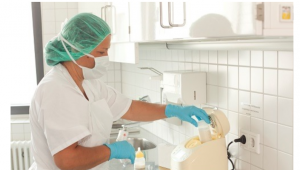If a newborn infant cannot be breastfed, the best alternative nutrition for babies born with a very low birth weight is donated human milk. During the present pandemic caused by the coronavirus, using donor milk could, however, raise safety concerns. The study “holder pasteurisation of donated human milk is effective in inactivating SARS-CoV-2” conducted at the University of Toronto, now showed that donor human milk is safe to use after pasteurisation, as the heating process eliminates potential contamination by the coronavirus.
Due to its unique composition of nutritious and health-promoting components, human milk is the first choice for newborn nutrition. Especially for infants born early or with low birth weight, provision of breastmilk is worthwhile to promote.
Viruses such as the coronavirus can potentially be transferred via breast milk. Milk donors are screened for COVID-19 symptoms, but so far not extensively clinically tested. It is therefore of importance to ensure that pasteurisation of donor milk is sufficient to remove potential contamination by the coronavirus.
The study from Unger and colleagues shows that heating donor human milk to 62.5°C for 30 min eliminates the coronavirus (SARS-CoV-2). No remaining activity of the virus could be observed after heating the milk samples.
If pasteurised, human milk is, therefore, safe to use as donor milk, which is of utmost importance to provide the best nutrition of babies with very low birth weight.
Interestingly, storing milk infected with SARS-CoV-2 at room temperature after frosting also led to a reduction of the virus activity over time.
Although the study from Unger et al. is only of small size, it is the first that reports that coronaviruses can be deactivated directly in human milk and thus provides very relevant insights.
Reference: Holder pasteurisation of donated human milk is effective in inactivating SARS-CoV-2
Paper available at: CMAJ
Full list of authors: Sharon Unger, Natasha Christie-Holmes, Furkan Guvenc, Patrick Budylowski, Samira Mubareka, Scott D. Gray-Owen, Deborah L. O’Connor
DOI: 10.1503/cmaj.201309


